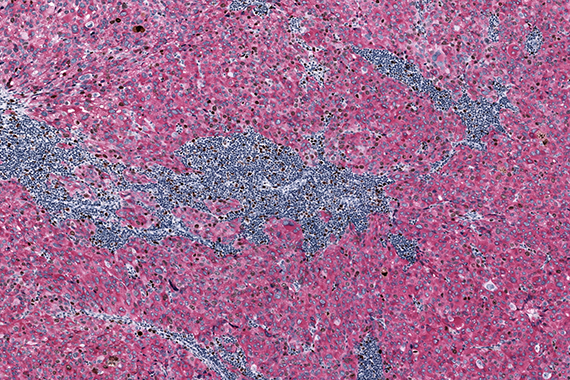-
The University
- Welcome
- Who we are
- Media & PR
- Studying
-
Research
- Profile
- Infrastructure
- Cooperations
- Services
-
Career
- Med Uni Graz as an Employer
- Educational Opportunities
- Work Environment
- Job openings
-
Diagnostics
- Patients
- Referring physicians
-
Health Topics
- Health Infrastructure
Immunohistochemistry
Immunohistochemistry is employed in addition to standard staining procedures (H&E) so that a more discriminating statement can be made about the current disease. It plays a great role in tumor diagnostics in particular.

The metastasis of a specific primary tumor entity can be classified according to different antigen patterns that are typical of tumors. Immunohistochemical tests are also being increasingly employed to select from among targeted therapies.
Many types of cells and tissue have specific (glyco)proteins in their nucleus, cytoplasm or cell membrane. These include cytokeratins, hormones, enzymes, mucins, intermediary filaments, cell cycle proteins and membrane glycoproteins of receptors. Other areas of application are the detection of pathogenic proteins and therapeutic targets (e.g., HER2/neu, PD-L1).
We offer a very large number of immunohistochemical staining methods and fluorescence in situ hybridization with a variety of probes (e.g., MDM2, HER2/neu) on site as well as flow cytometry tests for bronchial lavage.
The immunohistochemistry lab is equipped with six tissue staining machines. Its repertoire includes about 500 antibodies for diagnostic purposes. A further 400 antibodies are available for research applications. Research activities are invoiced using internal cost allocation with the research project partners.
Since IHC results depend on different factors, for example length of tissue fixation, it is important to confirm the reactions by following standardized protocols and including control tissue. Results are also validated by regular participation in certified round robin tests.
Lab
Brigitte Tessaro, BMA
T: +43 316 385 71804


